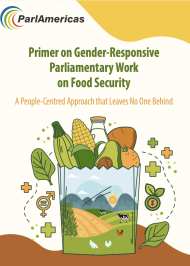
Gender equality and sustainable development are interdependent goals and cannot be achieved in isolation. Each of the priorities in the United Nations 2030 Agenda - represented by Sustainable Development Goals (SDGs) - are benefitted by gender equality, and work on each of the SDGs also contributes to advancing gender equality (which is also a standalone SDG: SDG 5). This relationship can be clearly seen with ending hunger (SDG 2) and achieving gender equality (SDG 5): gender inequalities must be addressed and women and girls must be guaranteed equal access to resources, opportunities, and rights in order to create sustainable, inclusive, equitable, and resilient agri-food systems that contribute to realizing the right to food for all people.
The actions taken in parliament can play a decisive role in removing the barriers to food and nutrition security for all when these are designed to respond to the differentiated needs and realities of diverse members of the population. Drawing on good practices, making use of disaggregated data, and facilitating active citizen participation in decision making, including by women and historically marginalized groups, are critical steps to reaching this objective. It is also essential to provide monitoring and oversight to ensure the effective implementation of adopted measures.




